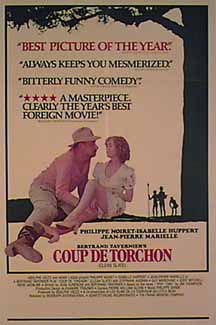

| Coup de Torchon | |
|---|---|

Theatrical poster
| |
| Directed by | Bertrand Tavernier |
| Screenplay by | Bertrand Tavernier Jean Aurenche |
| Based on | Pop. 1280 byJim Thompson |
| Produced by | Henri Lassa Adolphe Viezzi |
| Starring | Philippe Noiret Isabelle Huppert Jean-Pierre Marielle |
| Cinematography | Pierre-William Glenn |
| Edited by | Armand Psenny |
| Music by | Philippe Sarde |
| Distributed by | Parafrance Films (France) Quartet Films (US) |
Release date |
|
Running time | 128 minutes |
| Country | France |
| Language | French |
| Box office | $16.5 million[1] |
Coup de Torchon (also known as Clean Slate) is a 1981 French crime film directed by Bertrand Tavernier and adapted from Jim Thompson's 1964 novel Pop. 1280. The film changes the novel's setting from an American Southern town to a small town in French West Africa.[2][3] The film had 2,199,309 admissions in France and was the 16th most attended film of the year.[4] It received the Prix Méliès from the French Syndicate of Cinema Critics as the best French film of 1981.
Coup de Torchon was nominated for the Best Foreign Language Film at the 55th Academy Awards
In a small town in French West Africa in 1938, Lucien Cordier is the sole policeman. Unable or unwilling to assert his authority, he is scorned by everyone. His alluring wife, Huguette, openly lives with her lover, Nono, passing him off as her brother. Cordier is attracted to the playful young bride Rose but allows her abusive husband to beat her in the street without intervention. The head of the timber company, Vanderbrouck, daily insults him in public. Adding to his woes are a pair of deceitful pimps who openly flout the law and relish in humiliating him.
It's these pimps who push him over the edge, prompting him to consult his superior, Chavasson, who advises him to take decisive action. On the train back, he meets the attractive new teacher, Anne, whom he immediately warms to. Upon his return, he confronts the two pimps alone, shooting them dead and disposing of their bodies in the river. When Chavasson discovers this, Cordier implicates him in the act. Having outsmarted his boss and eliminated his main tormentors, Cordier sets his sights on others who have made his life miserable. Rose's husband meets the same fate as the pimps, and Vanderbrouck is dumped in a privy. When Rose's husband's servant returns with his master's body, Cordier kills him as well.
Upon catching Nono spying on Anne in the shower, Cordier beats him in the street. He then steals the money Huguette had been saving to leave him and visits Rose. Huguette and Nono, suspecting he plans to flee with Rose and the money, confront them. In a struggle, Rose shoots them both in self-defense. Cordier gives her the money and urges her to flee. With only Anne left in his life, he confesses his general despair and specific crimes to her. Though she's willing to accept him, he believes he's now undeserving of her pure love.
In the closing scene, he's alone under a tree, observing a starving native child, getting ready to kill with his revolver, when more starving children show up (more children than he has bullets for) he pauses, caressing his revolver.
The film had 2,199,309 admissions in France and was the 16th most attended film of the year.[4]
It received mixed reviews from U.S. and U.K. critics. Coup de Torchon has an approval rating of 83% on review aggregator website Rotten Tomatoes, based on 6 reviews, and an average rating of 7.5/10.[5] The New York Times praised the performances and "the meticulousness and conviction on display here" but also added that the film "seems strangely lacking in overall momentum and direction."[3] Roger Ebert called it "a cruel intellectual joke played on its characters" and said the film "left me cold, unmoved and uninvolved."[6] Time Out said "this eccentric, darkly comic look at a series of bizarre murders is stylishly well-crafted, and thoroughly entertaining" and "embellished with black wit and an elegant visual sense."[7] TV Guide called it a "stylish, twisted black comedy... with as dead-on an evocation of a torpid, seedy backwater as anyone has achieved on screen."[8]
|
Works by Jim Thompson
| |
|---|---|
| Novels |
|
| Films |
|
|
Films directed by Bertrand Tavernier
| |
|---|---|
|
| Authority control databases: National |
|
|---|